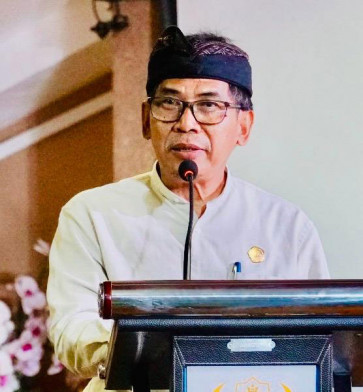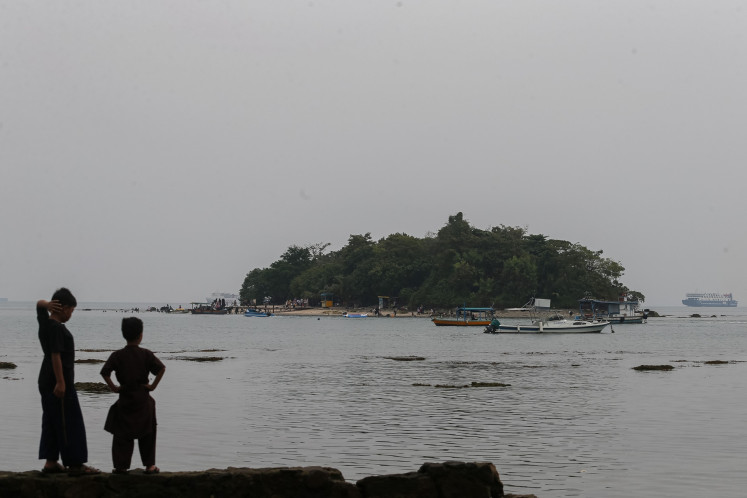Popular Reads
Top Results
Can't find what you're looking for?
View all search resultsPopular Reads
Top Results
Can't find what you're looking for?
View all search resultsWrong to make Indonesian Islamic State fighters stateless
Point of no return: Members of the Glorious Pluralist Volunteer Front (Barabaja) rally outside Merdeka Palace in Jakarta on Feb
Change text size
Gift Premium Articles
to Anyone

P
oint of no return: Members of the Glorious Pluralist Volunteer Front (Barabaja) rally outside Merdeka Palace in Jakarta on Feb. 10 to ask the government to block the return of about 600 Indonesians the group believes are Islamic State sympathizers. The government has bowed to the demand. (Antara/Wahyu Putro A.)
President Joko “Jokowi” Widodo finally decided not to repatriate the Islamic State (IS) sympathizers due to their potential security threat to the public. According to Presidential Chief of Staff Moeldoko, the government has stripped them of their citizenship, rendering them stateless.
The fight against terrorism clearly may justify such a policy. Nevertheless, terrorism can only be prevented, tackled and narrowed in its movement and space through comprehensive state policies that promote democratic political life, social welfare and the upholding of justice.
In formulating a counterterrorism policy, the state must fulfill its obligations in upholding the liberty of the person in a permanent balance with the protection of his or her security.
In this regard, Jokowi’s revocation of the citizenship of Indonesians who have joined IS is neither reasonable nor justifiable for two reasons.
First, the revocation of citizenship does not solve terrorism; it instead legitimizes IS as a state. Based on the United Nations Security Council (UNSC) Resolution 2249, IS is not a state, but a terrorist organization. Therefore the IS sympathizers are legally Indonesian citizens and the government cannot evade its constitutional mandate in dealing with them.
Second, the government’s authority to rescind citizens’ citizenship has no legal grounds. Indeed, stripping people of citizenship is not outlawed but Citizenship Law No. 12/2006 does not recognize dual citizenship or statelessness.
As annulling one’s citizenship could lead to statelessness, as in the case of the IS sympathizers, the policy potentially violates the law.
Leaving them stateless may breed new problems for global security. As we do not have any measure to closely monitor them, they still can reenter Indonesia through its porous borders.
Barring the IS supporters from returning home also breaches Law No. 12/2005 on the ratification of the International Covenant on Civil and Political Rights. Article 12 of the law guarantees that citizens can enter and leave their country.
One of the potential consequences for abandoning the IS sympathizers is they may recreate the movie Joker in the real world by inciting violent reprisals against the government, if not society. Statelessness, or abandonment, risks incubating a new wave of violent extremism. Essentially, efforts to deal with terrorism aim to maintain world peace, another constitutional obligation of the government. Indeed, the government needs to identify which IS sympathizers are in fact foreign terrorist fighters (FTFs). The government should seek prosecution of citizens suspected of involvement in terrorism.
Similarly, the government needs to respect the legal mechanisms that apply in countries where Indonesian citizens face charges of joining IS as FTFs.
For those who do not face terrorism charges, particularly women and children, the government must repatriate them according to the law and prepare all the tools needed to deradicalize them as stipulated in the 2018 Terrorism Law.
Based on the law former FTFs can be charged under Article 12, which reads: “Anyone who deliberately organizes, provides, or participates in military training, paramilitary training, or other training, both domestically and abroad, with the intention of planning, preparing, or committing a Terrorism Act, and/or participating in war outside the country for Criminal Acts of Terrorism may be sentenced to a minimum of four years in prison and a maximum of 15 years.”
One of the pretexts of the revision of the old Terrorism Law was the government’s difficulty in dealing with returning FTFs. Now that the new Terrorism Law will answer the government’s concern, it has no reason not to use the 2018 Terrorism Law, especially Article 12.
Of course, enforcement of the article requires sufficient evidence. Therefore, Indonesia must work with the Syrian and Iraqi governments to identify active FTFs. The government can also use other legal instruments such as the 2011 Immigration Law to deal with IS supporters. Bringing the FTFs to justice is in accordance with UNSC Resolution 2170 (2014).
Specifically, for women and children who traveled to Iraq and Syria, the government should implement a comprehensive deradicalization program, rather than punishment. In particular, the government should design and develop a new approach to improve the existing deradicalization program.
Until the end of 2015, a further 90 of 600 former prisoners were suspected of returning to terrorism, including two who were involved in the Sarinah attack in Central Jakarta in 2016. Some factors such as poor evaluation of design and method and little involvement by other non-security actors contributed to the program’s ineffectiveness.
Combining counterradicalization and deradicalization is one option the government can exercise. The objectives of the program include disengagement, reintegration, cessation of violence and rehabilitation.
Improvement in the deradicalization scheme is pressing, as the returnees may be exposed to radicalism and violent extremism for years. In addition, transparent and robust methods and techniques are needed to boost public confidence in the implementation of the program.
As terrorism expert Luke Bertram said, prior to understanding how terrorists may be deradicalized, the government should consider how terrorists are radicalized. Clear and measurable approaches such as how the program helps participants reintegrate and what roles community-based institutions can play to gather public support would
help the government set measures to reduce the potential risk of terrorism after we repatriate IS sympathizers.
Nevertheless, with or without repatriation, Indonesia remains vulnerable to terrorist threats. As long as politicians still employ political identity and hate speech as tools to gain popularity, radicalism may have a fertile ground in which to grow.
And politicization of the repatriation of IS sympathizers is only part of the attempt by politicians to stay relevant.
________
Both writers work at the Imparsial human rights monitor as executive director and senior fellow for security sector reform, respectively.









